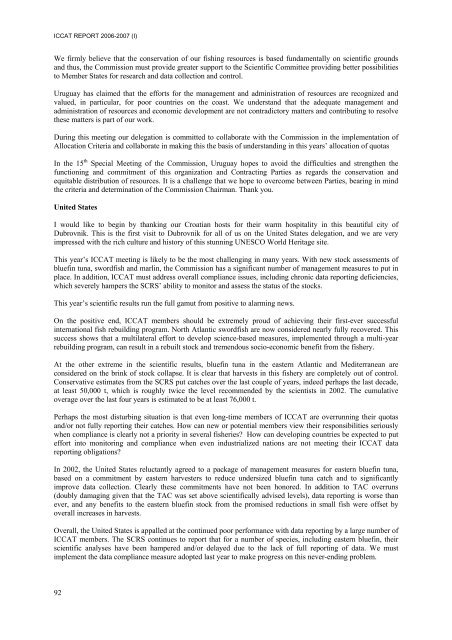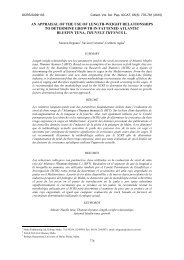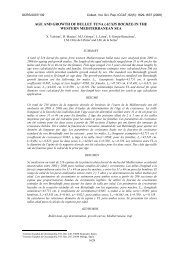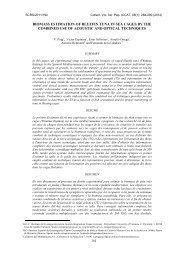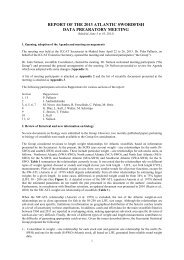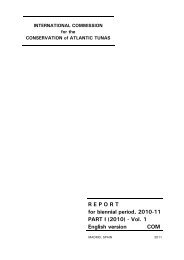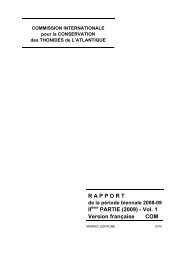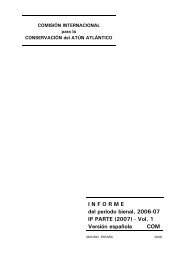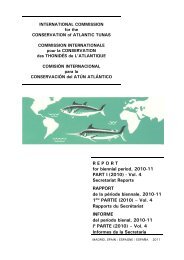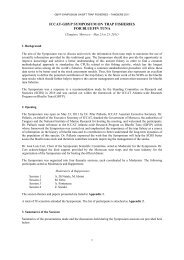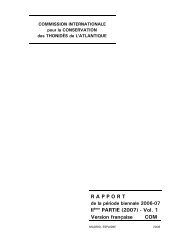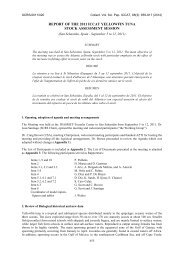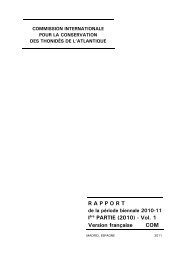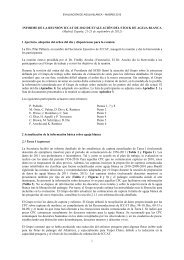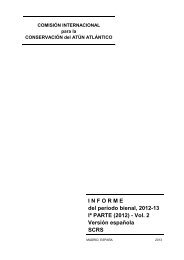R E P O R T for biennial period, 2006-07 PART I (2006) - Vol ... - Iccat
R E P O R T for biennial period, 2006-07 PART I (2006) - Vol ... - Iccat
R E P O R T for biennial period, 2006-07 PART I (2006) - Vol ... - Iccat
Create successful ePaper yourself
Turn your PDF publications into a flip-book with our unique Google optimized e-Paper software.
ICCAT REPORT <strong>2006</strong>-20<strong>07</strong> (I)<br />
We firmly believe that the conservation of our fishing resources is based fundamentally on scientific grounds<br />
and thus, the Commission must provide greater support to the Scientific Committee providing better possibilities<br />
to Member States <strong>for</strong> research and data collection and control.<br />
Uruguay has claimed that the ef<strong>for</strong>ts <strong>for</strong> the management and administration of resources are recognized and<br />
valued, in particular, <strong>for</strong> poor countries on the coast. We understand that the adequate management and<br />
administration of resources and economic development are not contradictory matters and contributing to resolve<br />
these matters is part of our work.<br />
During this meeting our delegation is committed to collaborate with the Commission in the implementation of<br />
Allocation Criteria and collaborate in making this the basis of understanding in this years’ allocation of quotas<br />
In the 15 th Special Meeting of the Commission, Uruguay hopes to avoid the difficulties and strengthen the<br />
functioning and commitment of this organization and Contracting Parties as regards the conservation and<br />
equitable distribution of resources. It is a challenge that we hope to overcome between Parties, bearing in mind<br />
the criteria and determination of the Commission Chairman. Thank you.<br />
United States<br />
I would like to begin by thanking our Croatian hosts <strong>for</strong> their warm hospitality in this beautiful city of<br />
Dubrovnik. This is the first visit to Dubrovnik <strong>for</strong> all of us on the United States delegation, and we are very<br />
impressed with the rich culture and history of this stunning UNESCO World Heritage site.<br />
This year’s ICCAT meeting is likely to be the most challenging in many years. With new stock assessments of<br />
bluefin tuna, swordfish and marlin, the Commission has a significant number of management measures to put in<br />
place. In addition, ICCAT must address overall compliance issues, including chronic data reporting deficiencies,<br />
which severely hampers the SCRS’ ability to monitor and assess the status of the stocks.<br />
This year’s scientific results run the full gamut from positive to alarming news.<br />
On the positive end, ICCAT members should be extremely proud of achieving their first-ever successful<br />
international fish rebuilding program. North Atlantic swordfish are now considered nearly fully recovered. This<br />
success shows that a multilateral ef<strong>for</strong>t to develop science-based measures, implemented through a multi-year<br />
rebuilding program, can result in a rebuilt stock and tremendous socio-economic benefit from the fishery.<br />
At the other extreme in the scientific results, bluefin tuna in the eastern Atlantic and Mediterranean are<br />
considered on the brink of stock collapse. It is clear that harvests in this fishery are completely out of control.<br />
Conservative estimates from the SCRS put catches over the last couple of years, indeed perhaps the last decade,<br />
at least 50,000 t, which is roughly twice the level recommended by the scientists in 2002. The cumulative<br />
overage over the last four years is estimated to be at least 76,000 t.<br />
Perhaps the most disturbing situation is that even long-time members of ICCAT are overrunning their quotas<br />
and/or not fully reporting their catches. How can new or potential members view their responsibilities seriously<br />
when compliance is clearly not a priority in several fisheries? How can developing countries be expected to put<br />
ef<strong>for</strong>t into monitoring and compliance when even industrialized nations are not meeting their ICCAT data<br />
reporting obligations?<br />
In 2002, the United States reluctantly agreed to a package of management measures <strong>for</strong> eastern bluefin tuna,<br />
based on a commitment by eastern harvesters to reduce undersized bluefin tuna catch and to significantly<br />
improve data collection. Clearly these commitments have not been honored. In addition to TAC overruns<br />
(doubly damaging given that the TAC was set above scientifically advised levels), data reporting is worse than<br />
ever, and any benefits to the eastern bluefin stock from the promised reductions in small fish were offset by<br />
overall increases in harvests.<br />
Overall, the United States is appalled at the continued poor per<strong>for</strong>mance with data reporting by a large number of<br />
ICCAT members. The SCRS continues to report that <strong>for</strong> a number of species, including eastern bluefin, their<br />
scientific analyses have been hampered and/or delayed due to the lack of full reporting of data. We must<br />
implement the data compliance measure adopted last year to make progress on this never-ending problem.<br />
92


